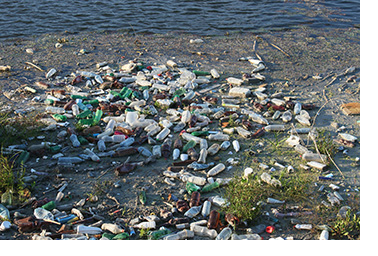2020: More Plastic Straw & Bag Bans; Are They Working to Decrease Plastic Pollution?
Municipal straw bans began in 2018 and the momentum continued through 2019 with many corporations like Starbucks, Walt Disney World, American Airlines and Norwegian Cruise Line Holdings phasing out single-use plastic straws. 2020 started with more straw bans in cities across the United States including Stuart, Fla., St. Petersburg, Fla., Union City, Calif. with more to follow mid-year. Adding to plastic straws, stirrers and cotton buds will be banned in England starting in April 2020. Additionally, more cities across the U.S. implemented plastic bag bans on January 1.
The question is, are these bans working to reduce waste and the amount of plastic in our oceans and waterways? Unfortunately, plastic pollution is still at an all-time high. Single use paper straws are being used in place of plastic straws (and not upon request only), consumers are still willing to pay for single-use plastic bags at grocery stores, gyms are still selling disposable water bottles and plastic is still being found in the stomachs of marine animals.
There’s now a new R in the Reduce, Reuse, Recycle phrase and it’s REFUSE. This is one of the easiest ways to reduce plastic waste. Refuse plastic straws at restaurants. Refuse disposable utensils when getting takeout. Refuse plastic kiddie cups with plastic lids if your children are old enough to drink out of glass. Refuse plastic bags at stores and restaurants.
Start 2020 off right with eco-friendly promotional products that will help reduce plastic consumption:
- Reusable lunch containers: Bringing your lunch to work is an easy way to reduce waste and it’s good for the wallet and waistline as well. Whether it’s dinner leftovers, a sandwich or salad, reusable containers are the first step to a waste-free lunch. Make taking lunch fun with trendy bento lunch boxes.
- Reusable utensils: When packing a meal for work or outdoor dining, add utensils from home in your bag. Another option is to invest in a portable utensil set that can be kept in the car, a bag or desk drawer.
- Reusable straws: If you must use a straw, choose a reusable one. Reusable wheat straw, silicone or stainless steel straws are great to keep at home, in the car or in a purse. There are many straw options that can be compacted into carrying cases for easy storage on the go.
- Reusable grocery and shopping bags: Plastic grocery bags are a huge source of litter on land and in oceans and waterways. Having a stash of reusable bags will make sure you can always refuse plastic. Make bags readily available by keeping sets at home, in cars and in a purse/briefcase. Foldaway bags are easily stowable and are especially handy when traveling to areas with plastic bag bans.
- Reusable water bottles: Disposable water bottles are hugely wasteful. The good news is it’s becoming easier to find filtered refill stations at airports, museums, college campuses and more. There’s even an app called Tap that shows users where to find free refill stations. Buy reusable water bottles for everyone in the family so there is never a need for single-use water bottles.
- Reusable coffee mugs and tumblers: Paper coffee cups are not widely recyclable. Do your part to reduce and invest in a travel tumbler. A bonus is that many coffee shops will give you a discount for bringing your own mug.
- Reusable vegetable and produce bags: There’s nothing wrong with putting apples loose in your grocery cart or in your bag at an outdoor market. But if you prefer the convenience of bags, invest in reusable produce bags. Some even claim to keep your produce fresh longer. If you forget to refuse, use the bags for pet waste disposal. Don’t have a dog? Your local animal shelter will gladly accept bags.
In addition to doing your part to reduce and practice mindful consumption, join beach or park cleanups which occur weekly across the county. Outdoor enthusiasts can take up plogging, a combination of jogging with picking up litter. Just because you didn’t put the litter there, doesn’t mean you shouldn’t pick it up. A little effort can go a long way to help the environment.



